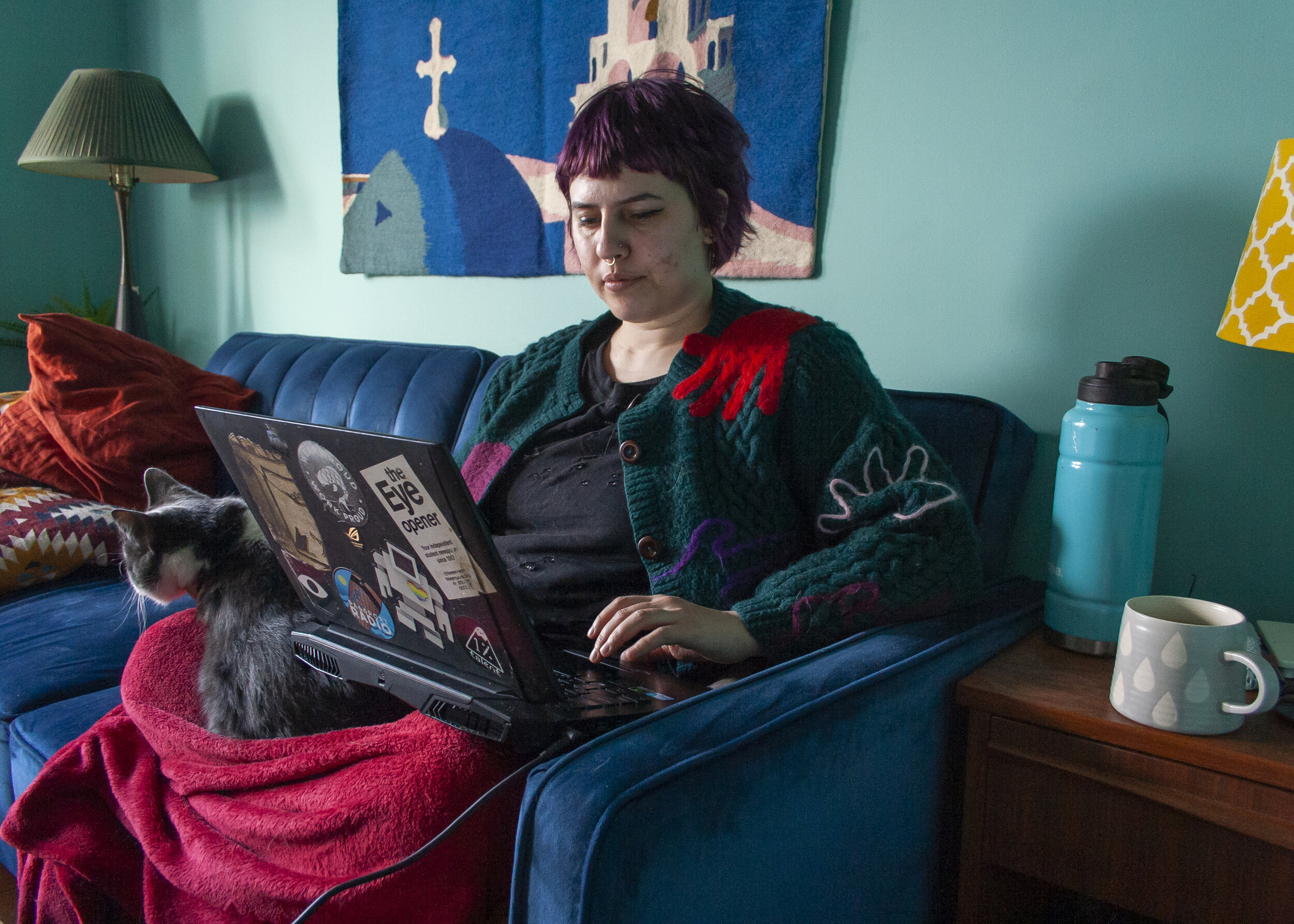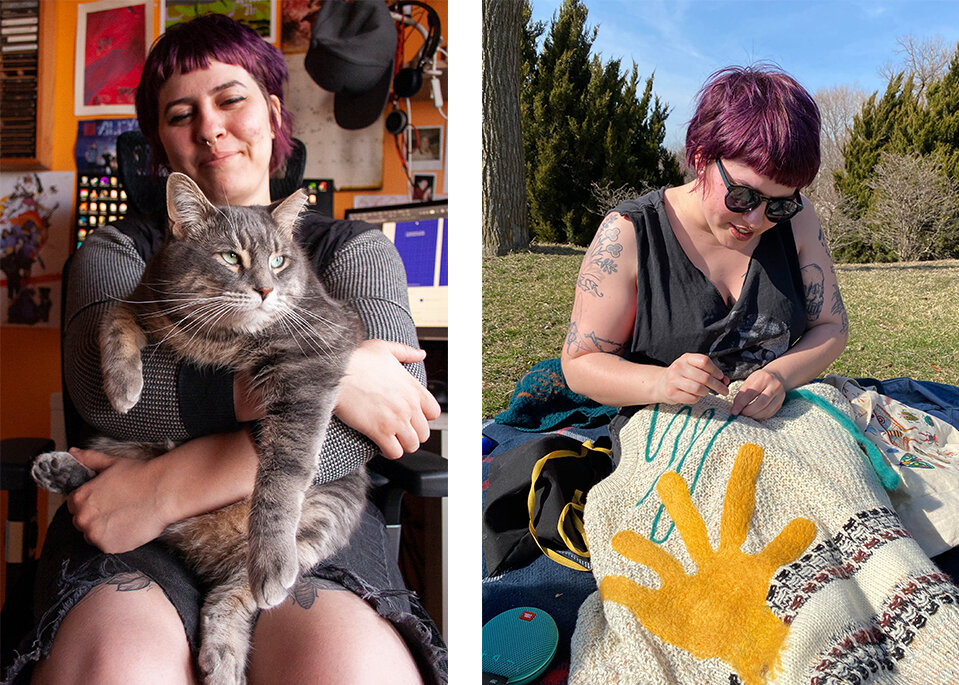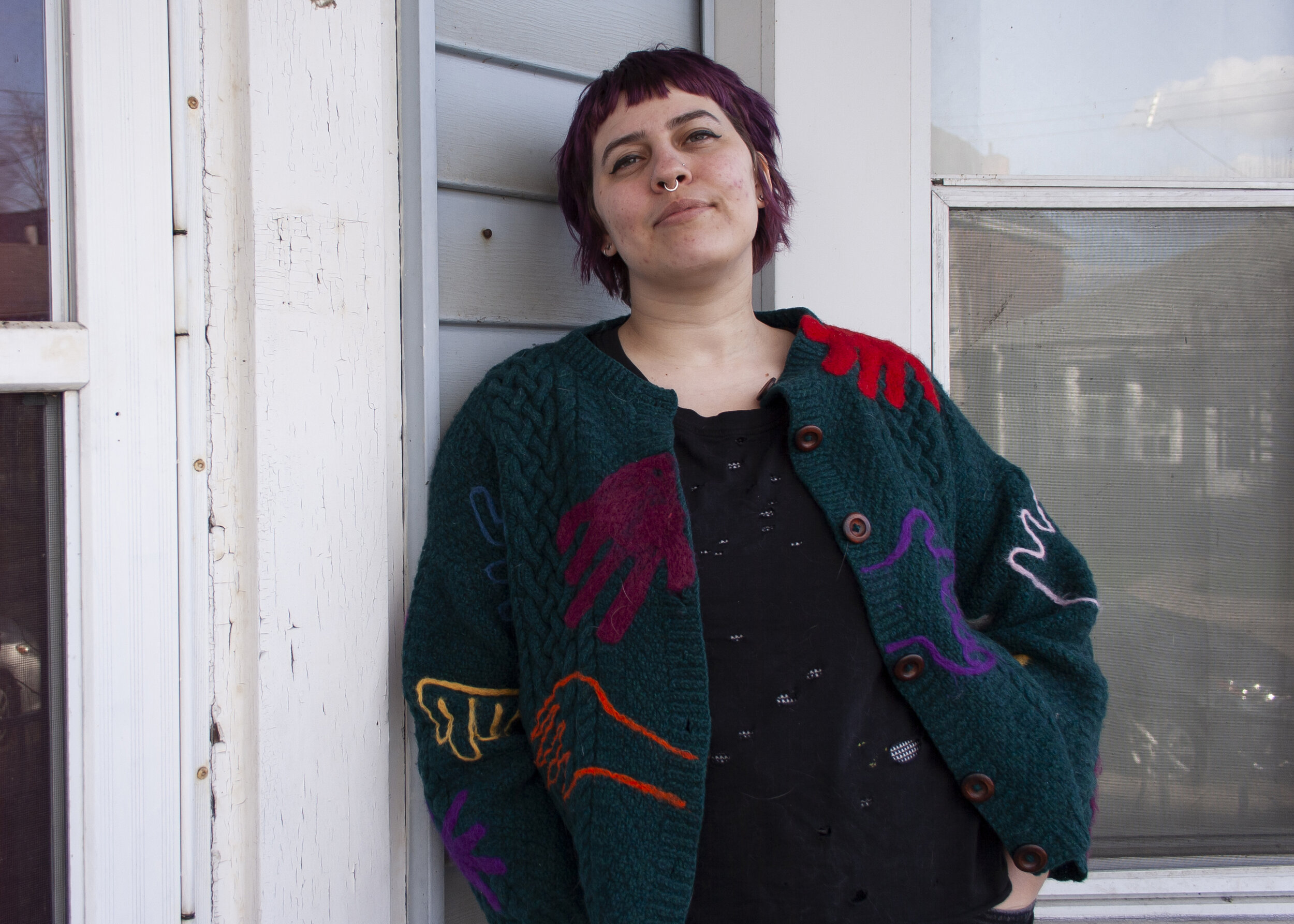Sid Drmay, Artist & Contract Worker
COVID Chronicles
Sid Drmay is a multidisciplinary artist and a self-employed contract worker. They currently work from home in customer service for a luxury outerwear company. While the pandemic has negatively impacted income-generating aspects of their artistic practice, new work from home possibilities finally created employment for them that accommodates their disability.



Sid Drmay moved to Hamilton four years ago after completing a degree in English at Ryerson University. They currently live with their partner Dan and their two cats they affectionately call their ‘sons,’ named Theo and Zero. Like many contract workers, work for Sid over the past year has been varied and inconsistent. They have completed volunteer shifts at a local record store, a short-term contract as a programming assistant at a large art gallery, and a temporary full-time gig as an urban researcher for a Canadian university. Currently, they work from home part-time under the official title of ‘Client Retail Relations and Logistics’ for a luxury outerwear company based in Toronto.
When the first lockdown began in March 2020, Sid expresses that they felt relief. “I had been unemployed for quite a few months and I was feeling like a big old failure because I couldn’t find anything [job]...then everyone was in the same boat as me for a little bit.” Previous to their contract ending, Sid was working in administration in a college. Because of their disability, they are unable to work customer service and retail jobs that many contract workers rely on between contracts. “Most retail places want you to work at least a five-hour shift [on your feet] which I can’t do.” They share that they considered returning to an old retail job but were unable to because “there was no option for accommodation.”
Luckily, Sid has been able to find some work that they are able to complete from home, however short-lived. “It’s pretty common for contract work to be pretty brief but my COVID contracts have been the shortest contracts I’ve ever worked.” Through their diverse work experience in the past year, Sid has also maintained numerous ‘side-hustles:’ a term many millennials use to refer to additional self-employed work. They run an Etsy store called WebSpookie where they sell their zines and t-shirts. They also facilitate workshops. “During it all, I’ve picked up little gigs here and there, usually zine workshops or equity workshops. Those are usually an hour or two, one-time paid situations.”
As is the case with most self-employed contract-based work Sid has no health insurance, no paid sick days, and no paid time off. Additionally, they are not on payroll which means that their self-employed income is taxable and no automatic CPP contributions. When speaking about the precarious nature of their employment they jokingly add, “Job security? What is it? I’ve never heard of it!” While Sid acknowledges that there are a lot of negative aspects to the contract work that they do, they say, “I have come to embrace the freedom of it.”
COVID has made some art-related activities for Sid impossible, including vending at art fairs which they relied on for income. “I like to be at the weirdo art fairs where people are making strange and unusual things...you see so much creativity at these events and you meet so many people who have a lot of really interesting perspectives.” Some fairs that Sid regularly tables at are The Hamilton Feminist Zine Fair, The Punk Rock Flea Market, Hamilton Zineposium, and Toronto Canzine. Without the busyness of markets to prepare for, Sid has had some extra time which they use to delve into sewing. “I started with some light mending with things that I had, and then I started with some alterations and then I said f*ck it, let’s go and do a full garment and then I just kept going.” They find the process of sewing calming amidst the panic and uncertainty of the pandemic.
Sid also spends a lot of their free time online, as a millennial who ‘grew up on the internet.’ They gain inspiration from Instagram and were inspired to begin needle-felting directly onto wool sweaters by illustrator Elizabeth Haidle. Needle felting is the process of weaving wool fibres together using a special barbed needle to create a matted textile. Sid’s current project involves needle felting hands onto sweaters. “As the pandemic started I just got really obsessed with drawing hands...we can’t touch each other right now and all I can draw are Hands! Hands! Hands!” They use their Instagram profile @cyborggarbage to solicit paid sweater commissions which keeps them busy outside of their part-time position working from home.
Sid says that the work-from-home accommodations that have been made for workers during the pandemic have been beneficial for people with disabilities. “For years we’ve been told that there’s no way for these kinds of accommodations to exist in the workplace….You can’t take too many sick days and you can’t have too many medical appointments. And now it turns out that it was a possibility the entire time.” While Sid doesn’t love their current contract, it’s work that helps them pay the bills and it meets their physical needs. “It’s interesting to see what accommodations can be made when everyone needs it, not just a few people...It’s just that capitalism hates disabled people.”
